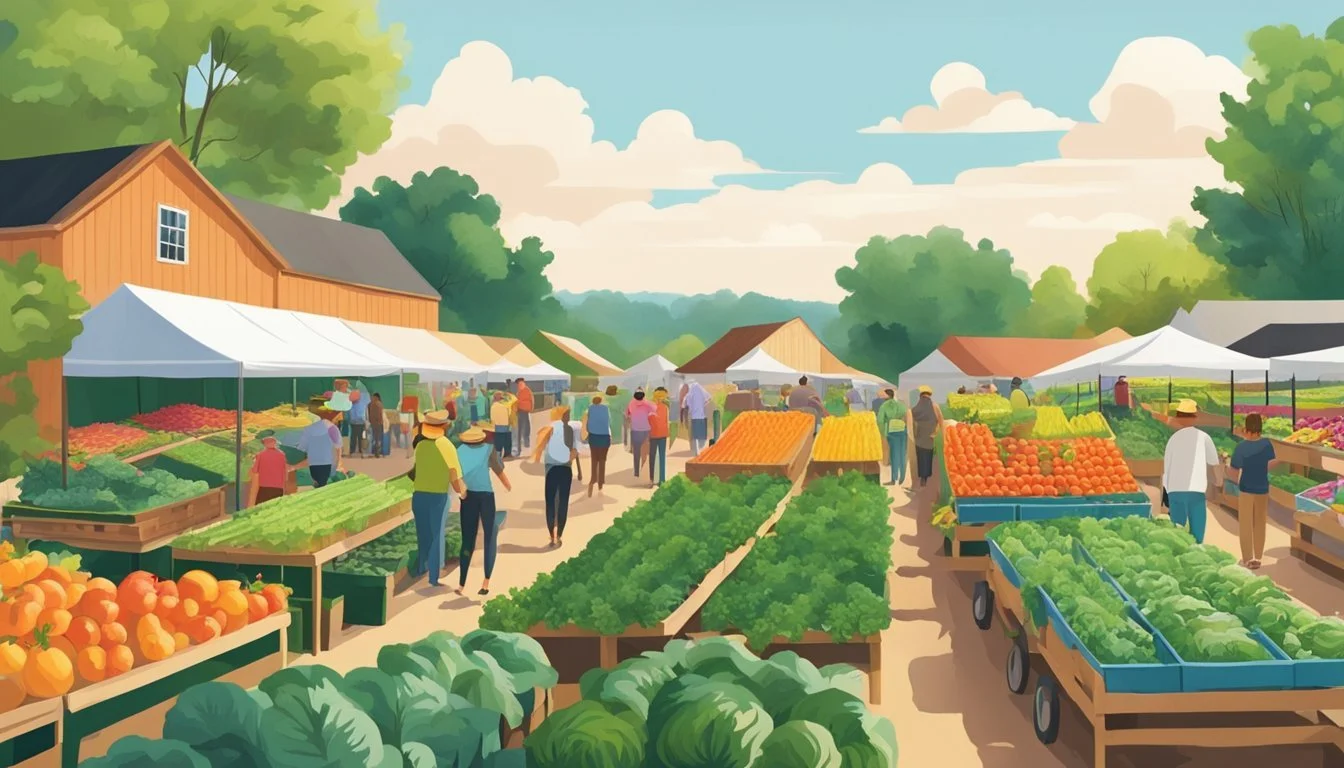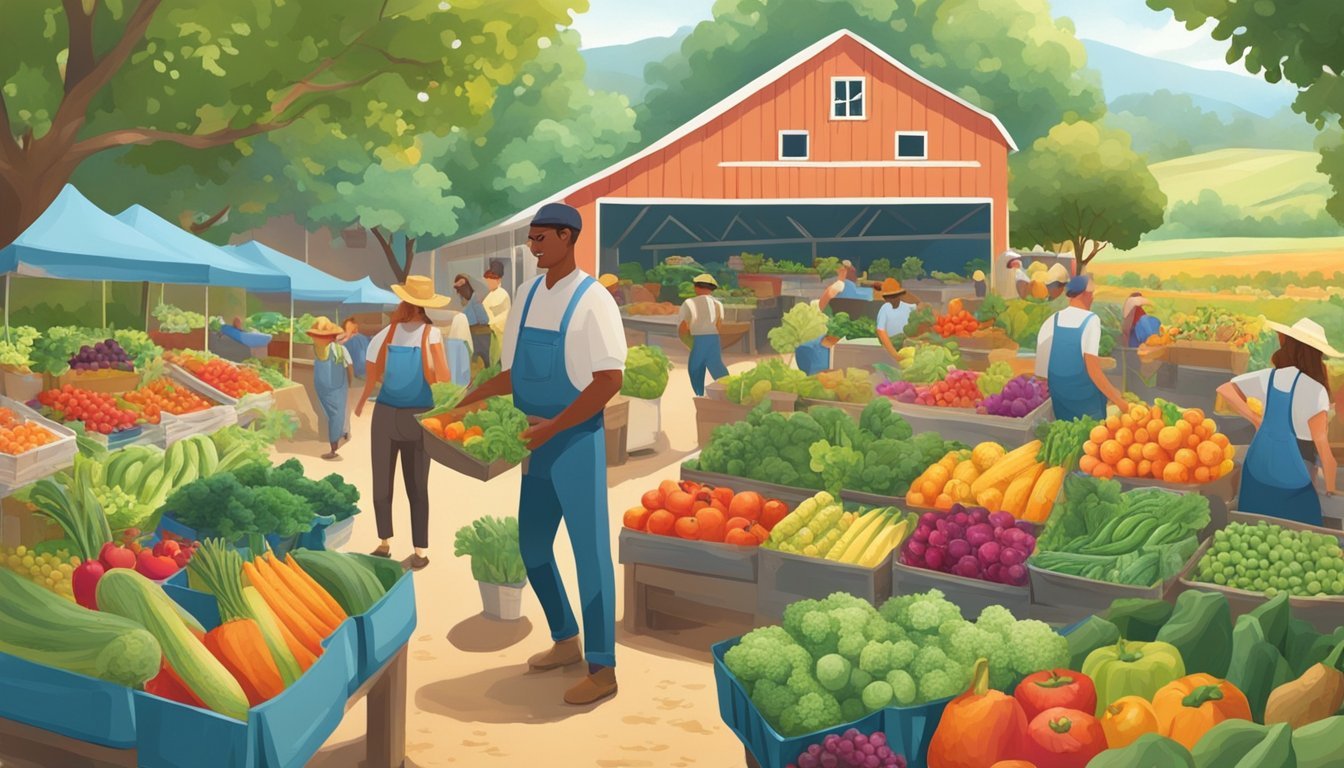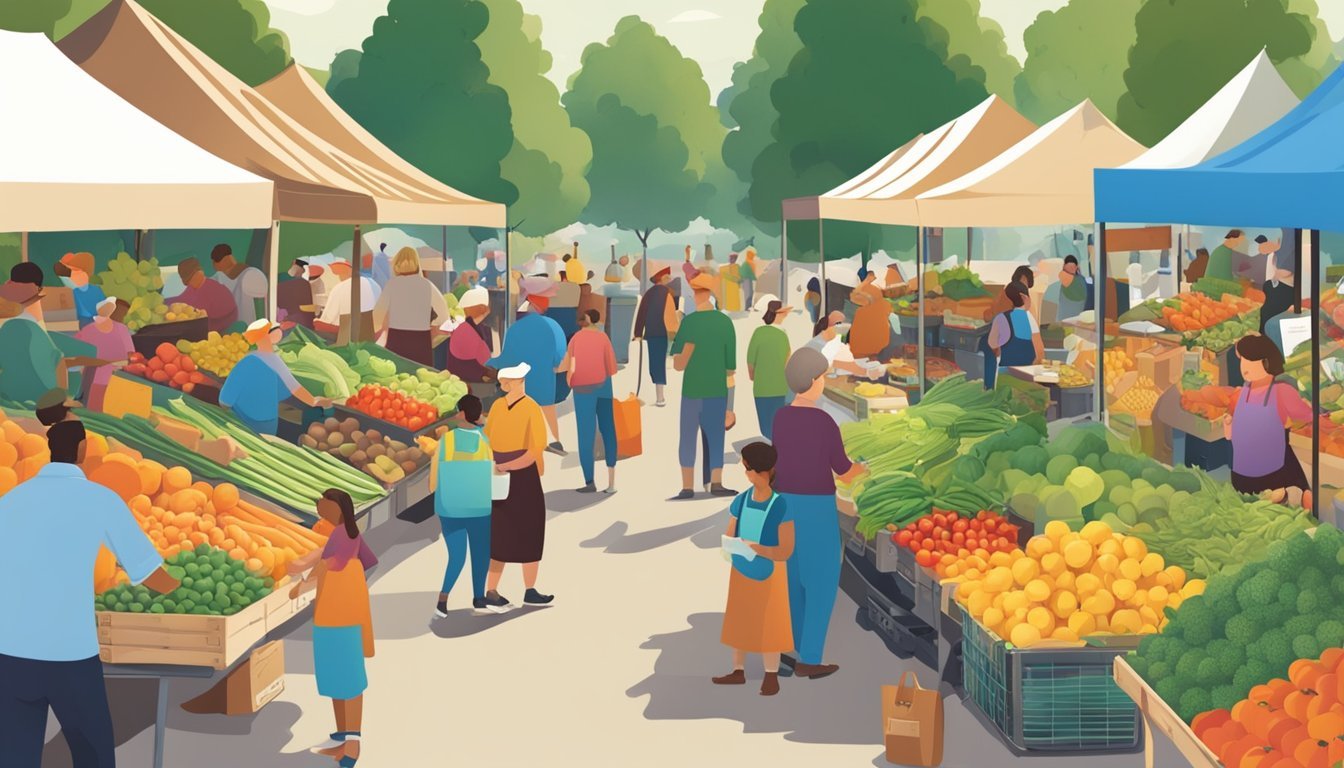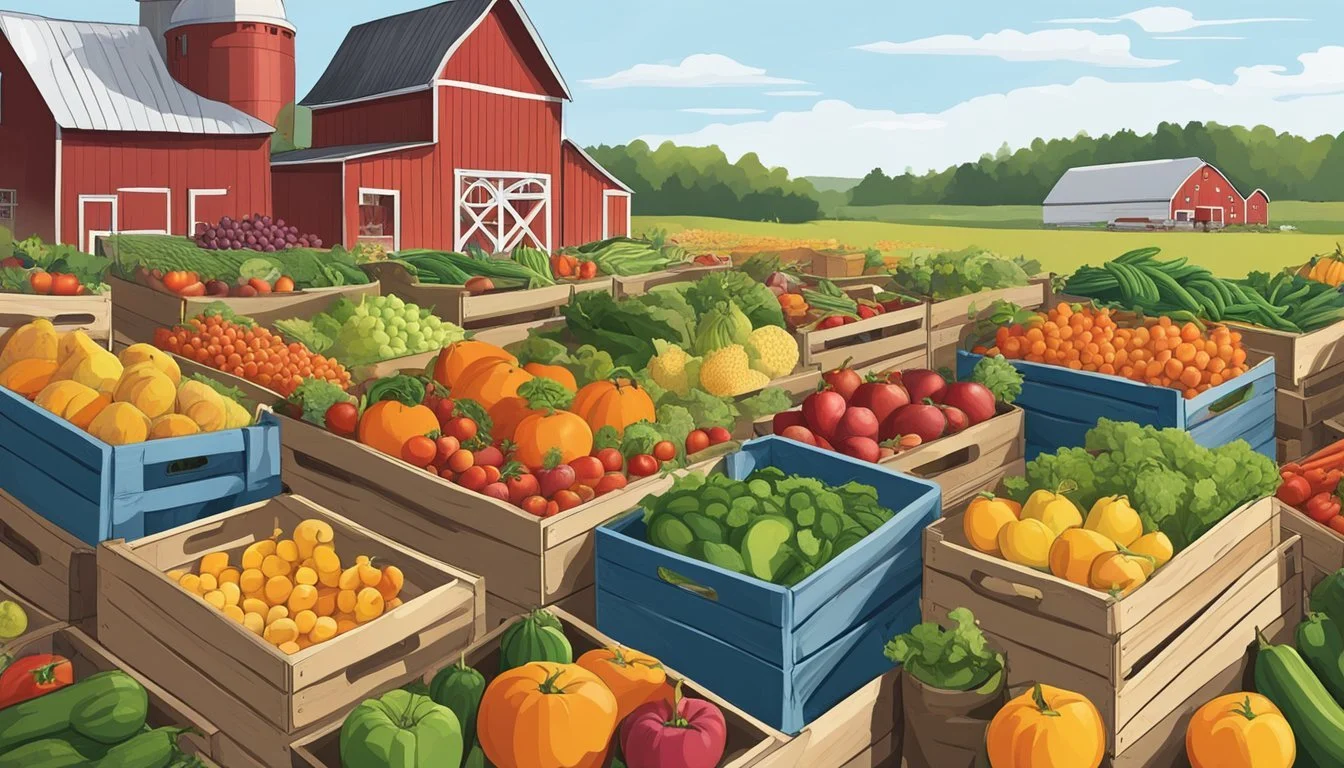Community Supported Agriculture in Michigan
A Guide to Local CSA Programs
Community Supported Agriculture (CSA) represents a partnership between local farmers and community members in Michigan. This model facilitates mutual support—members purchase shares of a farm's harvest in advance, providing farmers with the required upfront capital for the season. In return, members receive a portion of the farm's yield, typically delivered as a weekly assortment of fresh, locally grown produce. This arrangement helps small farms to thrive by ensuring a stable market for their goods, while also allowing Michiganders to participate directly in the local food system.
Michigan's landscape of CSA programs is diverse, reflecting the rich agricultural heritage of the state. From the urban farm settings like Tiny Acres in Hamtramck to established entities like Thornapple CSA, these programs offer a range of organic and non-GMO produce while promoting sustainable farming practices. CSA's in Michigan are more than just a source of fresh vegetables; they are a commitment to food equity, local economies, and environmental stewardship.
Through collaborations such as the Michigan CSA Network, farmers across the state are increasing food access and supporting small farm viability. These networks also serve as a platform for CSA farmers and support organizations to learn and grow together. By fostering community connections and ensuring an ethical approach to agricultural production, CSA's in Michigan bolster the movement for more resilient and equitable food systems.
History and Evolution of CSA in Michigan
Community Supported Agriculture (CSA) in Michigan has mirrored the wider adoption of CSA practices seen across the United States, offering farmers a means to ensure financial security while providing communities access to fresh, locally sourced food. The CSA model emphasizes a sustainable approach to agriculture, where the connection between producers and consumers is strengthened.
In Michigan, CSA farms have grown in number, with approximately 350 farms currently integrating this model into their operations. These farms vary in size and the types of produce they offer, but they share a common goal of fostering a local food system. The increase in CSA farms signifies a shift towards more sustainable farming practices and a burgeoning appreciation by consumers for fresh, local produce.
Michigan's farmers have found that CSA reduces financial risks as community members fund production upfront. This financial structure allows for better planning and resource allocation for the farming season. In return, members of the community receive a portion of the harvest, sharing the risks and rewards of farming with the producers.
The development of CSAs in Michigan reflects a broader movement to rebuild local economies, prioritize food security, and support environmentally conscious agriculture. Additionally, CSAs often serve as educational hubs, informing members about the importance of sustainable farming practices and the challenges faced by today’s farmers.
Key milestones in the history of CSA in Michigan:
1986: Coincides with the founding of two of the first CSAs in the United States, leading to wider awareness and adoption.
21st Century: Significant growth in the number of CSA farms, with members advocating for local, sustainable produce.
Today: CSA continues to gain traction, intertwining Michigan's agricultural heritage with modern, community-centric food systems.
Understanding CSA Programs
Community Supported Agriculture (CSA) programs in Michigan offer an innovative approach to buying fresh, seasonal food directly from local farms. Through memberships, customers can purchase a share of the harvest and experience the true flavors of each season.
Defining CSA and Its Principles
CSA is a model where consumers buy subscriptions―prepaid shares of a farm's upcoming harvest. Generally, people become members before the growing season starts, and in return, they receive periodic distributions of freshly harvested produce. This system creates a partnership between the farm and the community, resting on the core principles of mutual benefit and shared risk.
Benefits of Joining a CSA
When one joins a CSA program, they contribute to the local economy and support Michigan farms directly. The advantages are manifold:
Fresh produce: Members enjoy a bounty of fresh, often organic, produce picked at the peak of ripeness.
Knowledge of origin: Consumers know where their food comes from and how it is grown.
Seasonal variety: CSA share contents change with the seasons, offering a rotating selection of fruits and vegetables.
Supporting local agriculture: Payments help farm operations thrive at the start of each season when they need funds the most.
Typical CSA Model and Structure
A typical CSA functions on a seasonal subscription basis, where the length of a season can vary but often coincides with regional growing periods. The structure of a CSA involves:
Membership: An individual signs up and pays in advance for a season's worth of produce, thus becoming a member.
Shares: The member is entitled to a portion of the farm's harvest, known as a share.
Distribution: Shares are typically distributed weekly or biweekly throughout the season.
Variety: The content of the shares usually includes a diverse array of vegetables and fruits with occasional additions such as herbs and flowers.
By adhering to this model, CSA programs in Michigan promote a sustainable food system and foster closer farmer-consumer relationships.
Local Impact of CSAs
Community Supported Agriculture (CSA) programs in Michigan significantly affect local communities, economies, and the environment by promoting sustainable agriculture and strengthening relationships between consumers and local farmers.
Strengthening Community Bonds
In Michigan, CSAs have been instrumental in forging strong links between local farmers and consumers. With direct interaction through subscription-based produce boxes, individuals become more engaged with the source of their food, fostering a sense of community. They understand the seasonal growing cycles intimately, aligning their consumption patterns with the local harvest.
Supporting Michigan's Economy
Economic Growth: CSA programs contribute to the financial stability of Michigan's local farmers by providing upfront capital through season-long subscriptions. This cash flow helps farmers plan their season with less financial uncertainty, ensuring the continued production of fresh, often organic, produce.
Job Creation: By investing in CSAs, subscribers are indirectly contributing to the creation and maintenance of agricultural jobs within the state.
Market Expansion: Farmers are encouraged to diversify their crops to meet the varied demands of CSA members, leading to market expansion and less dependency on a limited number of cash crops.
Environmental Benefits
Sustainable Practices: CSAs in Michigan often use ecological farming methods, reducing reliance on harmful pesticides and fertilizers. This approach aligns with sustainable agriculture principles, leading to:
Soil Health: Enhanced agricultural practices maintain soil fertility and structure, preventing erosion and degradation.
Local Food Miles: A reduction in transportation for locally consumed produce lowers carbon emissions and contributes to cleaner air.
By connecting consumers with local seasonal food directly from farmers, CSAs have become a cornerstone of sustainable living in Michigan, allowing for a resilient food system that supports local farmers, the economy, and the environment.
Types of CSA Farms in Michigan
In Michigan, Community Supported Agriculture (CSA) farms vary by scale, agricultural practices, and location, each offering unique benefits to their members and communities while emphasizing sustainable and local food production.
Small Family Farms
Small family farms are the cornerstone of Michigan's CSA landscape. They often emphasize a close relationship between the farmer and the community, providing shares of their harvest directly to consumers. Sustainable practices are a priority, as these farms typically manage smaller plots of land, which allows for meticulous attention to soil health and biodiversity.
Certified Organic Farms
Certified organic farms adhere to stringent USDA organic regulations that exclude the use of synthetic pesticides and fertilizers. These farms focus on the ecological balance and contribute to the statewide efforts in enhancing sustainable agriculture. By investing in organic CSA shares, consumers support environmentally friendly farming methods and can enjoy produce free from synthetic additives.
Urban and Community-Based Farms
Urban and community-based farms are innovative models that transform city landscapes into productive agricultural spaces. These urban farms work to shorten the food supply chain and provide fresh produce within city limits, thus reducing food miles. They also often serve a social purpose, increasing access to fresh foods in urban neighborhoods and often engaging community members directly in the farming process.
Seasonal Harvest and Produce Variety
Michigan's CSA programs offer a rich array of fresh produce to their members, with variety depending on the seasonal cycles. The boxes provide a selection of vegetables and fruits, from leafy greens like kale to crisp cucumbers, reflecting the state's diverse agricultural outputs.
What to Expect in Your CSA Box
When receiving a CSA box in Michigan, members can anticipate a rotation of produce typically available during certain parts of the growing season. Early in the year, one might find a variety of greens including kale, spinach, and lettuce. As the season progresses, a greater diversity appears:
Spring: tender leafy greens, radishes, and green onions
Summer: cucumbers, tomatoes, peppers, and a variety of berries
Fall: robust squashes, apples, and root vegetables like carrots and beets
CSA members enjoy the benefit of experiencing the freshest items picked at the peak of their season, offering both an enhanced flavor profile and nutritional value.
Understanding Seasonal Cycles
Michigan’s seasonal cycles greatly influence the harvest and, consequently, the contents of the CSA boxes. In this state, the majority of fresh produce starts to become available in late spring, continuing into the fall. Here, structured in a timeline, are the expected seasonal availabilities:
Late Spring: Harvest begins with crops like asparagus and strawberries.
Summer: A peak season for freshness, summer yields an abundance of fruits and vegetables, including peaches, cucumbers, and an assortment of greens.
Early Fall: Apples and pumpkins take the stage as the weather cools.
It's essential for CSA members to understand that agriculture is subject to the whims of weather and other variables, so they share in both the bounty and the risks of farming. This partnership underscores the CSA model, where fresh, seasonal produce is valued above all.
In-Depth Look at CSA Membership
Community Supported Agriculture (CSA) in Michigan offers individuals an opportunity to become integral members of local farming. By purchasing shares, members receive weekly distributions of fresh produce while supporting their farmers directly.
How to Become a Member
One initiates their CSA membership by selecting a farm within Michigan's diverse CSA program network. A potential member typically signs up through the farm's website, where they can fill out a membership form and pay for their shares. The sign-up process generally requires providing contact information, such as an email, to facilitate smooth communication with the farmer.
Cost and Payment Options
The cost of joining a CSA in Michigan can vary. Several factors influence pricing, such as the length of the subscription and the variety of produce offered. Payment plans often range from:
Single payment: A one-time upfront fee for the season.
Installments: Periodic payments (monthly, for example) throughout the season.
Farmers may also offer sliding scale fees or accept subsidies to accommodate varying financial capabilities of prospective members.
Communication with Your Farmer
Clear communication is a cornerstone of the CSA experience. Members are encouraged to use email for direct communication with their farmers. This channel is pivotal for members who have questions about their shares, pickup logistics, or wish to know more about farm practices. Farmers provide weekly updates on expected produce in the upcoming delivery and any changes regarding pick-up times or locations.
Local Food and Agriculture Education
In Michigan, education on local food and agriculture is primarily disseminated through community events, workshops, and school programs. These educational avenues aim to engage the community in understanding the importance and benefits of Community Supported Agriculture (CSA), and to encourage participation in local food systems throughout the growing season.
Community Events and Workshops
Community events and workshops provide hands-on opportunities for residents to learn about local food systems and CSA farms. These events often feature:
Cooking demonstrations: Utilizing fresh produce from CSA shares.
Farm tours: Offering an inside look at the day-to-day operations of CSA farms.
Gardening classes: Educating individuals on starting their own gardens with techniques suited to Michigan's growing season.
Through these workshops, families and individuals are able to engage with farmers, learn about sustainable agriculture practices, and discover how to incorporate fresh, local produce into their daily diets.
School Programs and Partnerships
School programs play a crucial role in introducing children to the concepts of local food systems and agriculture. Partnerships between schools and CSA farms in Michigan may include:
Curriculum integration: Where agriculture and local food topics are embedded into science and health classes.
Farm visits: Allowing students to experience farming firsthand and understand where their food comes from.
School gardens: Empowering students with the knowledge to grow their own food and participate in the local food system.
These partnerships aim to create a foundation for lifelong awareness and support of local farms, strengthening the community's connection to the growing season and local food producers.
Food Preparation and Usage Tips
Michigan's CSA programs provide an abundance of fresh produce, offering a wealth of opportunities for cooking and preserving the harvest. Exploring creative recipes and employing proper storage techniques ensures that individuals can maximize the health benefits and flavors of their local vegetables.
Recipes and Cooking Suggestions
Cooking with CSA Vegetables: Community Supported Agriculture provides a variety of seasonal vegetables which can inspire a multitude of healthy and flavorful recipes.
Roasted Root Vegetables: Toss carrots, beets, and potatoes with olive oil, salt, and your favorite herbs. Roast at 400°F until tender and caramelized.
Fresh Salads: Combine leafy greens such as spinach and arugula with sliced cucumbers, tomatoes, and a light vinaigrette for a refreshing meal.
Stir-Fry: Quickly cook bell peppers, onions, snap peas, and bok choy with a dash of soy sauce and serve over brown rice for a simple yet nutritious dish.
Storing and Preserving Your Produce
Keeping Vegetables Fresh: Proper storage extends the life of CSA vegetables, ensuring they remain healthy and delicious until used.
Leafy Greens: Store unwashed greens in a plastic bag with a paper towel to absorb moisture, and keep them in the crisper drawer of your refrigerator.
Root Vegetables: Keep potatoes, carrots, and beets in a cool, dark place; a basement or root cellar is ideal.
Freezing: Blanch vegetables like broccoli or green beans in boiling water, then cool rapidly in ice water, drain, and freeze to preserve their quality.
Frequently Asked Questions About CSAs
Community Supported Agriculture (CSA) programs offer fresh, healthy food while supporting local Michigan farmers. When a consumer purchases a CSA share, they're investing in a farm's growing season and in return, receive a portion of the farm's harvest.
Choosing the Right CSA for You
When selecting a CSA, one should consider the variety of produce offered, pickup locations, and subscription terms. A good tip is to look for CSA programs that align with one's weekly consumption patterns and dietary preferences. It's advisable to inquire about the length of the CSA season and the expected volume and variety of produce in the share.
Tips for Choosing a CSA Description Variety of Produce Seek out CSAs that provide the fruits and vegetables you enjoy or want to try. Pickup Locations Ensure there are convenient pickup points for the weekly or biweekly boxes. Subscription Terms Understand the payment schedule, season length, and policies on missed pickups.
Managing Expectations
It's important to manage expectations when participating in a CSA. At the beginning of the season, shares might be leaner, with less variety than during peak harvest months. Subscribers should expect fluctuations in the weekly shares, as they are subject to the farm's yield and the season's conditions.
Expectations for CSA Shares Description Seasonal Variety A CSA share's diversity can change; early in the season, expect fewer options. Share Volume The quantity provided may vary with farm productivity and weather patterns. Understanding Fluctuations One should anticipate variances and appreciate the natural ebb and flow of farm produce.
When considering a CSA, individuals should ask informed questions and communicate with farmers to ensure the CSA meets their household's needs.
Beyond CSA: Expanding the Local Food Movement
After establishing a robust network of Community Supported Agriculture programs in Michigan, the local food movement looks to further avenues to strengthen its ties to sustainable practices and community engagement.
Farmers Markets and Direct Sales
Farmers markets provide an essential platform for Michigan producers to engage directly with consumers, fostering a transparent connection between the source of produce and its end-use. LocalHarvest acts as a valuable online tool, guiding consumers to local farmers markets where fresh, often organic, produce, and hand-crafted goods are available. The proliferation of these markets encourages sustainable farming practices and supports the local economy.
In Michigan, direct sales do not stop at farmers markets. The Michigan Farm to Family program is a notable example, enhancing the distribution of locally sourced, nutritious food directly to households. This effort promotes a sense of community by linking families with the farmers who nourish them.
Agricultural Policies and Support Programs
Agricultural policies in Michigan aim to bolster local food systems by providing grants and resources to small-scale farmers. Initiatives such as the Michigan Agricultural Preservation Fund grant opportunities for local farmers to thrive while maintaining sustainable practices.
Support programs often provide essential training and technical assistance to local food producers. They are geared towards ensuring long-term sustainability and success, thereby enhancing the vitality of the local food community. These programs, frequently backed by state and federal funding, are instrumental in reinforcing Michigan's local food infrastructure.
Contributing to CSA Success
The success of Community Supported Agriculture (CSA) in Michigan hinges on community involvement and education. Volunteers play an essential role in supporting these local farms, while promotion of CSA benefits in communities increases awareness and participation.
Volunteer Opportunities
Volunteers are the backbone of many CSAs, offering their time and skills to support the agriculture process. They can contribute through:
Farm Assistance: Helping with planting, weeding, and harvesting.
Event Staffing: Assisting during CSA local food events or farm tours.
Skill Sharing: Offering expertise in areas such as marketing, education, or event planning.
Relationship building between volunteers and farms fosters a sense of community and strengthens farm viability.
Promoting CSA Benefits in Your Community
A key aspect of elevating CSA success is through promoting its benefits, which requires clear communication about:
Health Advantages: Fresh, locally-sourced produce promotes better nutrition.
Economic Impact: Joining a CSA supports local farmers directly, bolstering the local economy.
Educational campaigns and word-of-mouth are effective strategies for demonstrating CSA value to potential members and enhancing community support.











